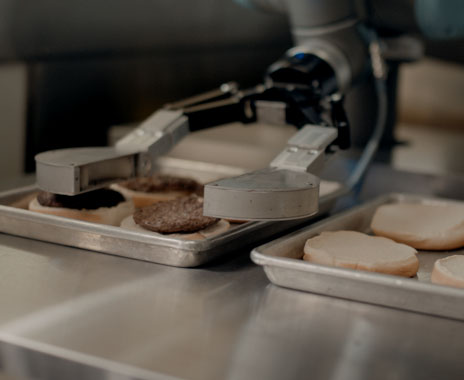If artificial intelligence can drive a car, why can’t it flip a burger?
This was the question facing Miso Robotics when it decided to bring the future into the back-of-the-house. Starting early 2018 and headed worldwide by the end of the following year, Flippy, a robot that can grill burgers and place them on buns, will be rolling down the line alongside human employees.
At a CaliBurger location in Pasadena, California, the artificial intelligence-driven robot made its debut on March 7. Miso Robotics and Cali Group say each restaurant in the chain, which includes more than 50 locations, will have their own Flippy within two years.
“Much like self-driving vehicles, our system continuously learns from its experiences to improve over time,” says David Zito, CEO of Miso Robotics, in a release. “Though we are starting with the relatively ‘simple’ task of cooking burgers, our proprietary AI software allows our kitchen assistants to be adaptable and therefore can be trained to help with almost any dull, dirty or dangerous task in a commercial kitchen—whether it’s frying chicken, cutting vegetables or final plating.”
Miso Robotics is using computer vision and deep learning software to bring foodservice robotics to life. The company says its collaborative kitchen assistant “handles the hazardous, tedious, and time-sensitive aspects of grilling, and cooks burgers to perfection every time.” Not to mention, it doesn’t bother an existing layout.
But don’t get all “I, Robot” just yet. The company says the arrival of Flippy won’t signal the departure of its current staff. In fact, the hope is that it will allow workers to enter the dining room and boost customer service through face-to-face engagement. Some employees will also have to be trained to operate Flippy.
Driving this innovation, in addition to the obvious cost and consistency benefits, is the desire to improve efficiency. In February, 48 percent of restaurant companies reported that they planned to add staff during the first quarter at the hourly employee level, compared with 66 percent in Q4 of 2016, according to TDn2K. And, naturally, increased turnover results in decreased quality, as restaurants have to train and retrain staff.
“The application of artificial intelligence to robotic systems that work next to our employees in CaliBurger restaurants will allow us to make food faster, safer and with fewer errors,” says John Miller, chairman of Cali Group, in a release. “Our investment in Miso Robotics is part of our broader vision for creating a unified operating system that will control all aspects of a restaurant from in-store interactive gaming entertainment to automated ordering and cooking processes, ‘intelligent’ food delivery and real-time detection of operating errors and pathogens.”
FLIPPY | Miso Robotics from Miso Robotics on Vimeo.

